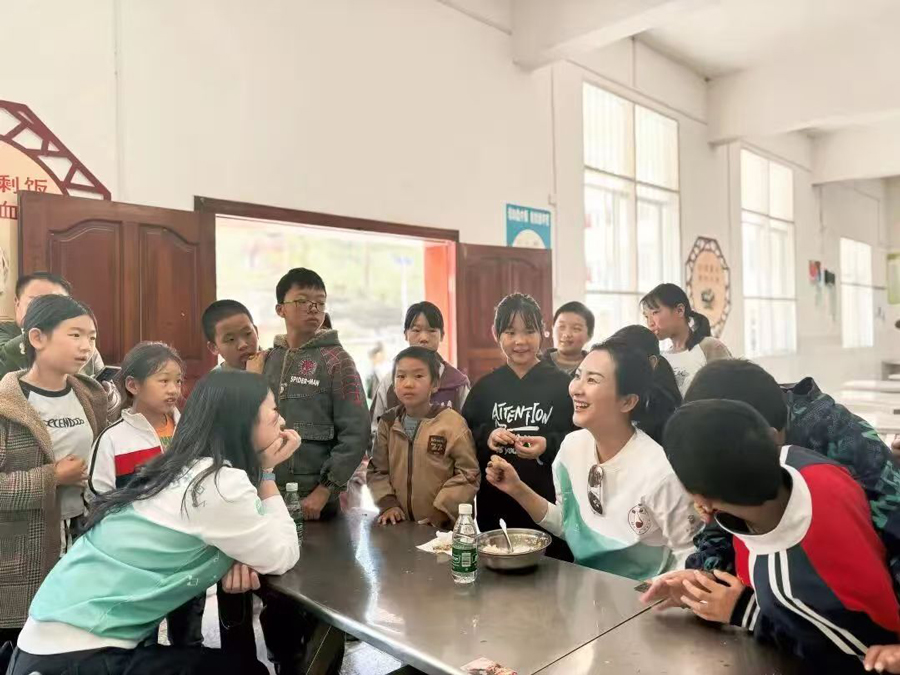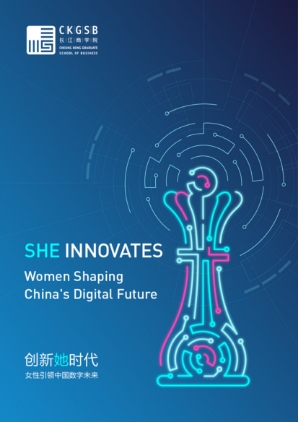Jiang Zhi, Alumna of CKGSB’s Women in Leadership Program (Juanyong) , Chair of Huachang Original Music Foundation
In a remote village in China, a young girl clasps a smart music device, her face lit with excitement. Behind this moment lies a shift in rural education that is being called a revolution, powered by innovation, determination, and the belief that technology can bridge the deep gaps in China’s educational landscape.
Jiang Zhi, an alum of CKGSB’s Women in Leadership Program (Juanyong) and founder of the Huachang Original Music Foundation, is from a family that values music highly. In fact, since she could remember, her family would assert to her that, “Music heals, nurtures the soul, and benefits children for life.” Her work shows how innovative technology can uplift rural music education where resources are scarce, making a lasting impact that traditional methods alone could not achieve.

Since 2017, Jiang has run the “Musical Seeds Grow with You” initiative—an ambitious effort to counteract the alarming neglect of music education in China’s rural schools. Despite China’s rapid economic growth, rural schools continue to face weak infrastructure, shortages of trained teachers, and outdated resources. Jiang’s answer? Harness technology to create sustainable, scalable, and modern music education.
Supported by the Huachang Original Music Foundation, her project connects local governments, schools, and society at large—deploying intelligent, portable music classrooms across 94 counties, impacting over 228 schools, 95,000 children, and countless teachers. More than philanthropy; it is a blueprint for how tech-driven education reform can surpass traditional barriers.
The journey began with the realization that conventional approaches—sending teachers or donating equipment—weren’t enough in remote, inaccessible areas. Jiang envisioned a portable, intelligent device delivering professional music lessons independently. Enter the Hezong Music Classroom, a prototype evolved through years of trial, error, and innovation.
By late 2017, the Huachang Original Music Foundation invested in developing a smart music machine—a compact, durable, and feature-rich device weighing just 60kg, equipped with an audio system, a 27-inch screen, and a vast digital library. For the first time, children in resource-poor rural schools could access high-quality music instruction.
This leap in technology—integrating hardware, software, and local adaptability—transformed the idea of rural music education from a pipe dream into a tangible reality. Jiang’s team showed that impact comes not just from resources, but from deploying technology smartly to democratize learning.
Deploying these devices was not without obstacles. Rough roads, logistical nightmares, and financial constraints often hampered progress. Jiang recalls her early trips hauling nearly 200kg devices through inaccessible terrain, her determination reflecting the core belief that technology can overcome physical barriers.
The evolution from version 1.0 to 3.0 of the smart music machine exemplifies the power of adaptive innovation. Lighter, more portable, and more user-friendly, these devices exemplify how continuous technological improvement directly translates into better educational delivery, especially when local teachers—often juggling multiple subjects—lack specialized training.
At its core, Jiang’s project proves that technology is not just a tool but a catalyst for educational equity. In rural Chinese schools lacking professional music teachers, the smart classrooms act as vital gateways to a rich, engaging, and comprehensive music curriculum. They empower local principals and teachers to create sustainable music programs, fostering community involvement and cultural pride.
Critics might question whether technology alone can fix educational disparities. Jiang counters with evidence: after five years of careful implementation, schools are capable of managing their programs independently, with ongoing community support sustaining the progress. Technology, she emphasizes, accelerates the social change that traditional aid often fails to deliver.
Jiang Zhi collaborated with “Beautiful China,” a national project promoting rural teaching, to deliver smart music devices to more counties. They selected 30 schools in poverty-stricken counties, which often lacked proper transportation infrastructure. Roads were rough; the devices, weighing nearly 200 kg each, required villagers to lift them manually using ropes, sometimes for over a kilometer. Reflecting on early efforts, Jiang shares that initial steps were quite stressful and resource-intensive.
Jiang remembers worrying the equipment would be damaged on rough roads, so she personally joined several delivery trips. After entering a village, trucks could not easily pass. In one case, people took turns to lift the machines along a 1km stretch of otherwise inaccessible road.
“Looking back now, we started out quite amateurish, not thinking about the cost. We just wanted to give children the best resources and see how a public welfare project could help them. I think this is the mental journey that many entrepreneurs experience when first engaging in philanthropy.”
By fostering local engagement and emphasizing sustainability, the Foundation continues to enrich rural children’s lives through music. Jiang believes, “Without music, life is worthless,” echoing Nietzsche’s sentiment that music nourishes the soul and adds color to childhood. This project exemplifies how targeted, innovative approaches can bring quality music education to rural areas, offering children joy and lifelong benefits.

Read how women leaders are reshaping China’s digital economy, combining research on AI’s mental-health impact with profiles of seven entrepreneurs advancing semiconductors, healthcare, data centers, and AI marketplaces.